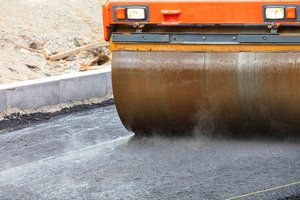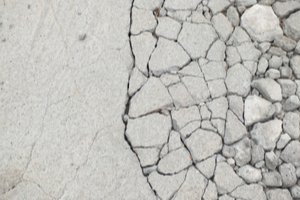If your driveway needs repairs, you may be wondering if there is a specific time of year that is best for this type of work. If the driveway is badly damaged, it should be repaired immediately to avoid further degradation. However, for less urgent concerns, it is imperative to time the work with the season in mind as driveway repair at the wrong time of year can end up being an expensive mistake.
Why Does Paving Require Certain Conditions?
Paving a driveway involves delivering a hot mix of asphalt in a heated truck to your home. The vehicle contains a special heating mechanism that keeps the asphalt in a liquid state so that the stones inside – also known as aggregate – remain suspended evenly and the viscosity is at the right level for pouring. If the outside temperature is appropriate, the asphalt can be poured and leveled off while it is still viscous before slowly cooling to create a strong and durable surface.

However, in colder weather, the asphalt will cool a lot faster after it has been poured, which may result in an uneven pour that makes the driveway difficult to use. Another problem that may arise is that the surface could harden before the job is finished. This reduces bonding between different areas of the driveway.
If this work is carried out when the ground is frozen, the embedded stones could loosen and break free from the asphalt mixture, creating an uneven look and level that may compromise the asphalt’s underlying structure. It could also allow for water intrusion, which may eventually lead to premature asphalt failure.
Can A Driveway Be Repaved In The Rain?
One question that many Northern Virginia homeowners may have is whether driveway repairs can be carried out on rainy days. While certain types of asphalt paving can sometimes be carried out in a light drizzle, the asphalt will cool too quickly if larger amounts of rain are falling, which could cause damage when laying the base layers. For this reason, many driveway repair contractors recommend the drier summer months for driveway repair projects.
What If It Is An Emergency?
If a driveway develops significant potholes, deep cracks or other indications of structural failure that require immediate repair in the middle of winter, there are a few ways to solve the problem.

A cold mix asphalt solution can be used to make some temporary repairs. Cold mix asphalt does not need constant heat thanks to the addition of specialized retarding chemicals to the mix. This allows it to remain pliable despite freezing temperatures. However, this is only a temporary solution to allow the driveway to remain usable throughout the winter months. It will need to be replaced with a proper hot mix once the temperatures rise.
Depending on the damage in the driveway, there may be other types of emergency patching that can be carried out to keep it from getting worse and allow the driveway to continue to be used until warmer weather returns.
The Ideal Seasons For Paving
The best time to pave a driveway is during the period from late spring until early fall, when temperatures are above 70 degrees. This is the right temperature to avoid the asphalt hardening too quickly and will give the contractor enough time to properly smooth it once poured.
Although any time within this range is suitable for paving as long as the weather is dry, there are a few reasons that summer stands out as the ideal time. First, it means the surface coating will have plenty of time to cure before winter sets in, making the sealing more durable. The summertime combination of warm temperatures, prolonged hours of sunshine, and higher overnight temperatures set the stage for proper curing.
Early fall is suitable, although it is not ideal. It depends on the temperatures in the area; a night temperature of 50 degrees or higher is needed for the seal coating curing process. Early spring is not recommended due to the abundance of precipitation and melting snow.
Other Factors To Consider
In addition to getting the timing right, there are a few other considerations when planning a driveway repair or repaving project.
The first factor is the depth of the topcoat, as thicker topcoats will retain heat longer. This means that it may be possible to pour the asphalt in slightly colder temperatures if the topcoat will be on the thicker side.
The size of the project also matters. If rain or cold temperatures are approaching, the overall square footage will impact how quickly the job will be complete.
Maintaining Your Asphalt Driveway

Although it is possible to repair asphalt driveways in the right conditions, it is also important to carry out regular maintenance throughout its lifespan to help it last longer. For example, asphalt driveways need to be sealed at least once every few years. Sealing protects the surface layer and prevents water from entering the asphalt, in addition to providing greater protection against higher temperatures.
Any cracks that emerge should be patched up as quickly as possible to prevent further damage. Although asphalt does not crack as easily as concrete does, no surface is truly indestructible.
Extreme weather can impact even the most durable asphalt driveways over time. For example, a rise in the temperature outside can cause the driveway to expand, and then a sudden drop in the temperature can cause the driveway to contract, raising the possibility of damage. When temperatures swing dramatically, these changes can cause cracks to form in all types of driveways. These cracks need to be addressed immediately to prevent further damage and avoid creating a safety hazard for those who use the driveway.
Contact The Asphalt Driveway Professionals
A local paving company that understands your area’s unique weather patterns can provide valuable advice and services for a successful project. For paving projects of all sizes in the Northern Virginia area, get in touch with the asphalt driveway professionals at Dirt Connections today.
Summary

Dirt Connections was started with one goal in mind: providing quality residential and commercial construction services to clients on time and on budget. Reach out for more information on how we can support your next project.
For your convenience our estimates are free and by appointment. Call 703-940-9949 for a free estimate today!









































